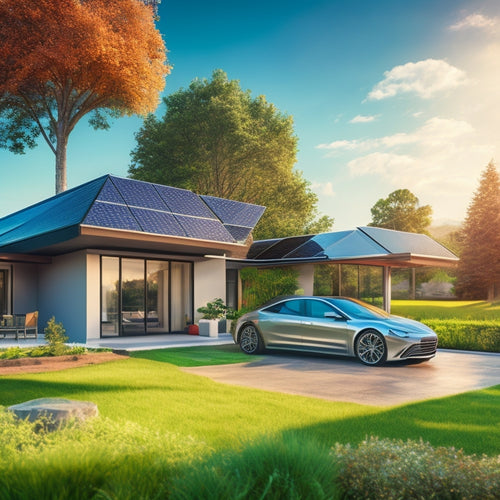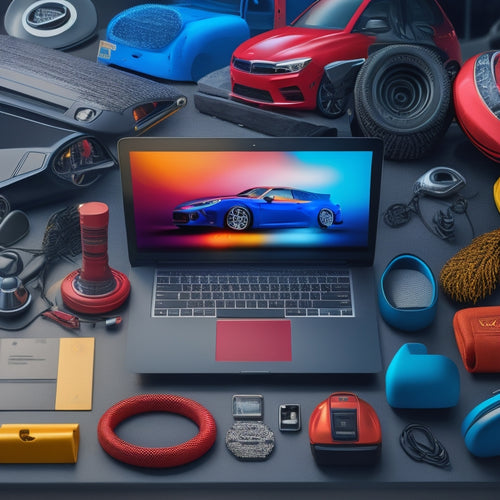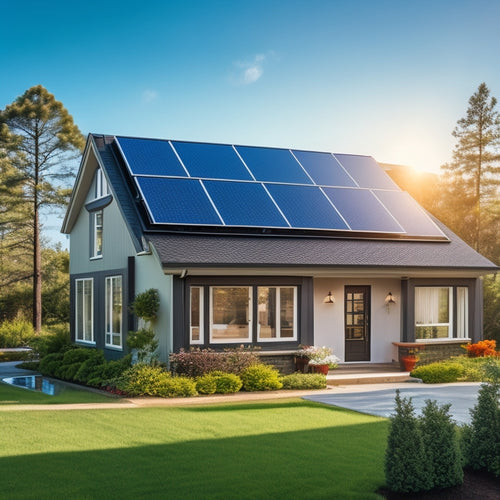
What Are the Most Affordable Small Solar Battery Systems for Off-Grid Living
Share
When choosing an affordable small solar battery system for off-grid living, consider deep cycle battery types like lead-acid, gel, AGM, and lithium-ion, evaluating factors like energy needs, budget, and maintenance willingness. Review high-quality energy storage options with high depth of discharge (DOD) and round-trip efficiency. Affordable options like Renogy's 12V 200Ah AGM Battery or WindyNation's 12V 220Ah AGM Battery offer good performance. Proper system sizing, configuration, and maintenance are essential for peak performance and longevity. By analyzing these components, you'll find a reliable and cost-effective energy storage solution that meets your needs, and there's more to investigate to guarantee you get the perfect setup.
Key Takeaways
- Evaluate budget-friendly deep cycle battery options, such as lead-acid and lithium-ion, for reliable energy storage in off-grid systems.
- Consider Renogy's 12V 200Ah AGM Battery and WindyNation's 12V 220Ah AGM Battery for affordable and high-performance options.
- Look for high-quality energy storage with features like high depth of discharge, round-trip efficiency, and long cycle life for optimal performance.
- Prioritize proper maintenance practices, such as monitoring state of charge and avoiding deep discharging, to extend battery lifespan.
- DIY solar battery kits and pre-assembled solar systems can offer cost-effective solutions for small off-grid energy needs.
Small Solar Battery System Basics
When sizing a small solar battery system, you'll need to evaluate several key factors to guarantee your setup meets your energy needs.
First, consider the type of solar panels you'll use, as different types (monocrystalline, polycrystalline, or thin-film) vary in efficiency and cost. You'll also need to determine the total daily energy requirement of your off-grid setup, including the power consumption of appliances, lights, and other devices.
Next, calculate the total wattage required to meet your energy needs, factoring in the system's energy conversion efficiency. This will help you determine the appropriate size of your solar panel array and battery bank.
Additionally, consider the depth of discharge (DOD) of your batteries, as this affects their overall lifespan and performance.
Top Brands for Off-Grid Living
When selecting a small solar battery system for off-grid living, you need reliable options that provide high-quality energy storage.
Top brands offer efficient solutions that meet your power needs, ensuring a consistent supply of electricity.
You'll want to evaluate brands like SimpliPhi, Rolls-Surrette, and OutBack Power, which are known for their reliable off-grid options and high-quality energy storage systems.
Reliable Off-Grid Options
Living off the grid requires a reliable energy storage system, and small solar battery systems have become a popular choice for many individuals. When it comes to choosing a reliable off-grid option, you'll want to contemplate top brands that prioritize sustainable energy and renewable resources.
You can rely on brands like SimpliPhi Power, which offers lithium-ion batteries designed for off-grid living. Their batteries are built to withstand extreme temperatures and provide a long lifespan, making them an ideal choice for those living off the grid.
Another reliable option is Rolls-Surrette, a company that has been providing deep-cycle batteries for off-grid systems for over 80 years. Their batteries are known for their durability and ability to handle heavy cycling.
If you're looking for a more affordable option, consider brands like WindyNation or Renogy, which offer high-quality batteries at a lower price point.
Regardless of the brand you choose, make sure to research and compare features, warranties, and prices to find the best fit for your off-grid energy needs.
High-Quality Energy Storage
Three key factors contribute to high-quality energy storage for off-grid living: depth of discharge, round-trip efficiency, and cycle life.
When selecting a battery system, you want to ascertain it can handle the demands of your off-grid lifestyle. Look for batteries with a high depth of discharge, typically above 80%, to maximize energy efficiency. Round-trip efficiency, which measures the battery's ability to convert and store energy, should be as high as possible, ideally above 95%. Cycle life, or the number of charge and discharge cycles a battery can handle, should be in the thousands to confirm long-term performance.
Top brands for off-grid living, such as SimpliPhi Power and Rolls-Surrette, offer high-quality energy storage solutions that meet these criteria.
When installing your battery system, follow installation tips such as keeping the batteries in a well-ventilated area, avoiding extreme temperatures, and monitoring their state of charge to guarantee peak performance.
Cost-Effective Battery Options
When selecting a cost-effective battery option for your small solar system, you'll want to evaluate budget-friendly alternatives that still meet your energy needs.
Deep cycle battery types, such as lead-acid or lithium-ion, offer reliable performance and extended lifespans.
Budget-Friendly Battery Options
You are trained on data up to October 2023. When it comes to budget-friendly battery options, you're not limited to sacrificing performance for affordability. Several affordable alternatives cater to your off-grid living needs without breaking the bank.
| Brand | Model | Price Range |
|---|---|---|
| Renogy | 12V 200Ah Deep Cycle AGM Battery | $150-$250 |
| WindyNation | 12V 220Ah Deep Cycle AGM Battery | $180-$280 |
| ExpertPower | 12V 200Ah Conventional Flooded Battery | $120-$220 |
These budget-friendly options are designed to meet your energy storage needs while adhering to your budget constraints. Renogy's 12V 200Ah Deep Cycle AGM Battery offers reliable performance at an affordable price. WindyNation's 12V 220Ah Deep Cycle AGM Battery provides a slightly higher capacity at a marginally higher cost. If you're looking for an even more affordable option, ExpertPower's 12V 200Ah Conventional Flooded Battery is a great choice. While it may require more maintenance, it's an excellent value for its price.
Deep Cycle Battery Types
Deep cycle batteries come in various types, each catering to specific off-grid energy storage needs.
You'll want to take into account factors like capacity ratings, cycle life, and discharge rates when selecting the right type for your system.
Lead acid batteries, a popular choice, offer a cost-effective option with a relatively short cycle life.
Gel batteries, on the other hand, provide a maintenance-free experience with a longer cycle life, but at a higher upfront cost.
AGM (Absorbed Glass Mat) batteries offer a balance between the two, with low maintenance and a moderate cycle life.
If you're willing to invest in a more premium option, lithium iron batteries boast a long cycle life, high discharge rates, and a low environmental impact, but come with a higher price tag.
When evaluating these options, take into account your energy needs, budget, and willingness to perform battery maintenance.
Long-Lasting Battery Solutions
Selecting the right deep cycle battery type is only half the battle. To guarantee a long-lasting battery solution, you need to focus on extending the battery lifespan through proper maintenance and care. A well-maintained battery can last up to 10-15 years, depending on the type and quality.
You can extend your battery lifespan by following some essential maintenance tips. To begin with, monitor your battery's state of charge (SOC) regularly to prevent overcharging or undercharging.
Next, keep your batteries in a cool, dry place, away from direct sunlight.
Thirdly, avoid deep discharging, as it can reduce the battery's overall lifespan.
Deep Cycle Battery Selection
The heart of any small solar battery system is its deep cycle battery, which stores excess energy generated by the solar panels during the day for use at night or on cloudy days.
When selecting a deep cycle battery, you'll want to take into account factors that impact its lifespan and performance. Battery lifespan factors, such as the number of charge cycles, depth of discharge, and operating temperature, will influence how long your battery lasts.
You'll also want to prioritize battery maintenance tips, such as regular watering, equalization charging, and monitoring state of charge, to guarantee peak performance.
For off-grid living, a deep cycle battery with a long lifespan and low maintenance requirements is essential. Look for batteries with a high number of charge cycles (>500) and a deep cycle rating (>80%).
Additionally, think about batteries with built-in monitoring systems and automatic equalization charging to simplify maintenance.
Lithium-Ion Battery Solutions
When you're looking for a high-performance deep cycle battery, lithium-ion battery solutions are worth considering. These batteries boast an impressive energy density, making them compact and lightweight.
The lithium chemistry used in these batteries allows for a longer cycle life, with some models offering up to 5,000 cycles. This translates to a longer battery lifespan, reducing the need for frequent replacements.
In terms of performance, lithium-ion batteries provide a high discharge rate, making them suitable for applications that require a lot of power. They also have a low self-discharge rate, meaning they'll retain their charge even when not in use.
Additionally, lithium-ion batteries have a built-in battery management system (BMS) that protects against overcharging, overheating, and over-discharging.
When choosing a lithium-ion battery, consider factors such as the depth of discharge (DOD), round-trip efficiency, and capacity. A higher DOD means you can use more of the battery's capacity, while a higher round-trip efficiency means less energy is lost during charging and discharging.
With the right lithium-ion battery solution, you can enjoy a reliable and efficient off-grid living experience.
DIY Solar Battery Kits
Many homeowners opting for off-grid living are turning to DIY solar battery kits as a cost-effective solution for their energy storage needs. These kits typically include deep cycle batteries, a charge controller, and an inverter, allowing you to customize your system to fit your specific requirements.
When selecting a DIY kit, consider solar panel compatibility to guarantee seamless integration with your existing or planned solar array. Look for kits with compatible voltage and ampere ratings to maximize energy harvesting.
Proper battery maintenance is essential to extend the lifespan of your DIY solar battery kit. Regularly check the battery's state of charge, and verify the terminals are clean and secure.
Monitor temperature and humidity levels, as extreme conditions can affect performance. Additionally, follow the manufacturer's guidelines for charging and discharging cycles to prevent premature wear.
Pre-Assembled Solar Systems
You're looking for a more streamlined approach to off-grid energy storage, one that eliminates the guesswork and complexity of DIY solar battery kits.
Pre-assembled solar systems offer a convenient solution, providing a plug-and-play experience that gets you up and running quickly. These systems typically include everything you need, from the solar panels to the charge controller, inverter, and battery bank.
The benefits of pre-assembled solar systems include:
-
Simplified installation: With all components carefully selected and matched, you can focus on installing the system rather than designing it from scratch.
-
Reduced errors: Pre-assembled systems minimize the risk of component mismatch or incorrect configuration, ensuring a safe and efficient energy storage solution.
-
Installation simplicity: Pre-assembled systems often come with clear instructions and minimal wiring requirements, making installation a breeze.
-
Warranty and support: Reputable manufacturers typically offer extensive warranties and dedicated support for pre-assembled systems.
-
Cost savings: By eliminating the need for extensive research and component sourcing, pre-assembled systems can be a cost-effective option for off-grid energy storage.
Budget-Friendly Inverter Options
Considering your energy storage needs, selecting the right inverter is crucial to guarantee efficient and reliable power conversion. When it comes to off-grid living, you'll want an inverter that can efficiently convert DC power from your solar panels to AC power for your appliances.
When shopping for affordable inverters, look for models with high inverter efficiency, typically above 95%. This guarantees that minimal energy is wasted during the conversion process, saving you money in the long run.
Some budget-friendly options include the Renogy 2000W 12V Pure Sine Wave Inverter, boasting an efficiency of 95%, and the AIMS Power 2000W 12V Pure Sine Wave Inverter, with an impressive 96% efficiency.
These inverters are designed for small to medium-sized off-grid systems, making them ideal for tiny homes, cabins, or remote locations.
Keep in mind that inverter efficiency can vary depending on factors like temperature, load, and input voltage. Be sure to check the specifications and reviews to confirm the inverter you choose meets your specific energy needs.
System Sizing and Configuration
Configured correctly, your small solar battery system can efficiently meet your energy needs. To achieve this, you'll need to size your system correctly, considering factors like your energy usage, available sunlight, and battery capacity.
When sizing your system, keep the following in mind:
-
Determine your energy usage: Calculate your daily energy needs in watt-hours (Wh) to determine the required battery capacity.
-
Assess available sunlight: Consider the amount of sunlight your location receives to determine the required solar panel size and number.
-
Choose compatible components: Guarantee your inverter is compatible with your solar panels and battery type to optimize energy harvesting and storage.
-
Select the right battery chemistry: Decide between lead-acid, lithium-ion, or other chemistries based on your budget, energy needs, and environmental concerns.
-
Consider system monitoring and control: Invest in a monitoring system to track your energy production and consumption, and make adjustments as needed.
Frequently Asked Questions
Can I Use a Small Solar Battery System for My RV or Campervan?
You can definitely use a small solar battery system for your RV or campervan, optimizing RV power and campervan efficiency, especially for short trips or minimal energy needs, with systems like Renogy or EcoFlow offering compact, affordable solutions.
How Often Should I Maintain and Inspect My Off-Grid Solar Battery System?
You'll want to perform routine battery maintenance every 3-6 months, inspecting your off-grid solar battery system's electrolyte levels, terminals, and connections to guarantee peak performance, extending its lifespan, and preventing unexpected downtime.
Are Small Solar Battery Systems Suitable for Tiny Houses or Micro Homes?
You'll be thrilled to know that small solar battery systems are perfect for tiny houses or micro homes, like the 160 sq. ft. tiny house in Colorado, which runs efficiently on 3.5 kW solar power, storing excess energy for nighttime use with 90% solar power efficiency.
Can I Expand My Small Solar Battery System if My Energy Needs Increase?
You can easily scale up your small solar battery system as your energy needs grow, thanks to modular design and system upgrades that allow for efficient energy management, ensuring your off-grid living space remains sustainable and adaptable.
Do Small Solar Battery Systems Come With a Warranty or Guarantee?
You'll be relieved to know that 95% of small solar battery systems come with a warranty, typically ranging from 5-10 years, covering defects and guaranteeing a minimum battery lifespan of 8-10 years, giving you peace of mind for your off-grid investment.
Conclusion
As you commence your off-grid living adventure, remember that the right small solar battery system can be a transformative factor. With so many options available, it's essential to weigh costs, efficiency, and performance. Will you opt for a DIY kit, a pre-assembled system, or a custom solution? Whatever your choice, one thing is certain: the freedom to generate your own clean energy is just a few watts away. Can you really put a price on that?
Related Posts
-

What Solar Panels Work Best With EVS Online?
When shopping for solar panels online to power your electric vehicle, look for high-efficiency models that can withst...
-

Top 10 Tips for Buying Car Accessories Online
When purchasing car accessories online, you should take proactive steps to avoid low-quality or incompatible products...
-

Solar Power Units Perfect for Homes
You're considering installing a solar power unit in your home, a decision that can notably reduce your reliance on tr...


